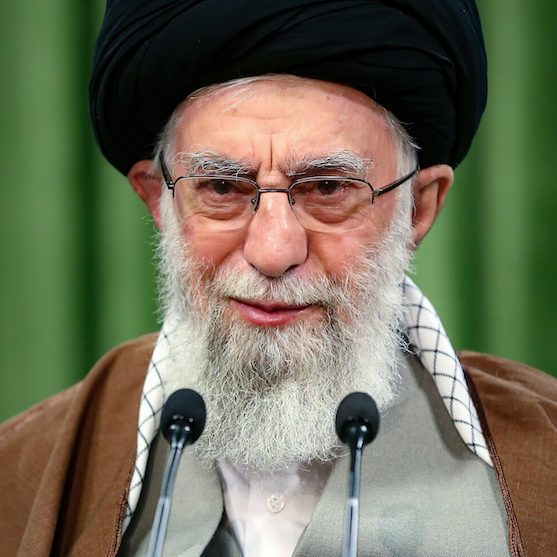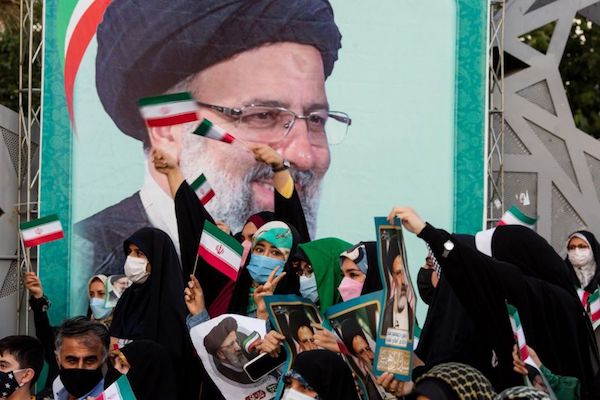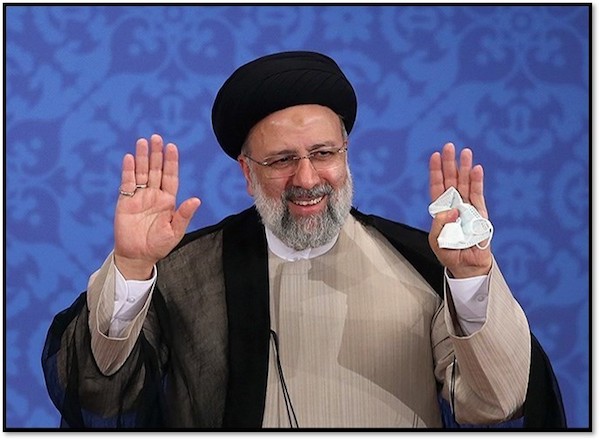The least that Ebrahim Raisi should do is to curtail the powers of the unelected strata, reform the financial sector, and open up the great Persian civilisation to the outside world.
Iran’s new President Ebrahim Raisi has a much tougher task than his predecessors as he has assumed office at a crisscrossed time of regional upheavals. The United States was made to bite the dust in Southwest Asia and its influence in the Middle East is diminishing too. Thus, as Raisi’s prime foreign policy priority is to engage Washington in its endeavour to get back to the P5+1 nuclear deal of 2015, there won’t be many takers of this initiative in the White House. President Joseph Biden’s administration is on a weak pitch and obliging Tehran would be the least of its priorities.
With one of the major foreign policy initiatives brow-beaten at the outset, Raisi’s two other formidable challenges are to revive the economy and tame the pandemic nexus. That too won’t be easy to attain. International donors estimate Iran’s inflation at 40 per cent, and the nation of 80 million is struggling with a nosedived economy that has no potential to bounce back until and unless sanctions are scrapped, and the country literally becomes part and parcel of international dispensation.
Attaining those objectives too is beyond Raisi’s scope of executive powers. He sits on a compromised note with the conservative religious cadres, and is known as a ‘Yes Man’ of the Supreme leader Syed Ali Khamenei who wields unlimited powers. Raisi, unlike Hassan Rouhani and Syed Khatami will prove to be a much weaker chief executive as any of his acts to reach out to the West and open up Iran would be contested tooth-and-nail by the all-powerful religious and military establishment. The reason is simple Raisi himself has been an ardent critic of reforms and his rise is widely seen as a tool to corner the reformist movement.

Raisi, unfortunately, carries the prefix of being an ultra hardliner owing to his history of summary judgments as the Chief Justice during the hey-days of the revolution. Perhaps, this is why a majority didn’t turn out to vote in the presidential polls. Rights groups accuse him of ordering the execution of around 5,000 political dissidents in 1988, apart from jailing dissidents.
People view him as an icon of status quo and a man who would resist any move towards egalitarianism and liberalism. If Raisi comes down on people demanding reforms on the streets, then he will be unnecessarily plunging himself in a quagmire of condemnation and isolation from the West.
As presidential candidates are screened and vetted by an unelected high-powered forum under the octogenarian leader, Iran, despite being the only functional democracy in the Middle East, could not make its mark on Westminster’s canvas. Raisi will surely have to look into this perspective and try to convince the clergy and the national security politburo that crushing dissent and stalling the youth has only brought a bad name for the revolutionary regime. Iran’s 1979 revolution has entered the third generation, and Tehran cannot resist a Glasnost of its own for long. Raisi, as an insider, can make a better sense in it.
Raisi’s foreign policy, nonetheless, would be one of continuity and not change. Apart from the nuclear deal, to which Khamenei wants instant adherence as a precondition to enter into talks with the US, the new president will have much on his sleeves.
Iran’s relations with the Arab world and its new quid pro quo with Russia and China especially, will test his presidency. Moscow is a favoured ally of Tehran in the changed geo-political spectrum, and Beijing has inked strategic geo-economic deals to the tune of $300 billion dollars. The next two decades mark special Sino-Iran understanding, which will see a multitude of mega-projects reshape the face of the region. But if Tehran continues to tread conservatism and refuses to open up, it would be its biggest blunder, leading it to its Waterloo!
Raisi will be expected in all humility to make the conservative cadres understand that Iran’s future lies in engaging the West, and making inroads in the Middle East. For that to happen, a serious review of foreign policy is needed. Tehran’s present unconditional support to Hezbollah in Lebanon cannot continue for long. So is the case with its ‘mysterious’ relationship with Damascus. Syria is sine qua non for Iran’s outreach to the Mediterranean and the heart of Middle East, but not at the cost of pushing Tehran in isolation.
Similarly, support to the Houthis and meddling in Yemen has bred instability. Would Raisi reconsider that jaundiced spectrum is anybody’s guess. Take the case of Iraq. Despite the same Shia wavelength and unanimity of views, Iraqis have never endorsed the Iranian module of post-1979 governance. Nationalism calls the shots and not sect-laden fraternity in their bilateralism.
The point is, Iran has to sever its ties with all militant factions and non-state actors in the Mideast if it has to become a full international partner on the world stage. There are no two opinions over it in Washington, Brussels, Canberra and even Beijing!
Last but not least, Raisi should walk a few extra miles in rewriting ties with Saudi Arabia and the United Arab Emirates. Dispute over thumb islands with the Emirates and an off-set with Riyadh is not serving any purpose. Iran’s magnanimity in sparing pieces of its erstwhile Persian Empire territories with Bahrain, Kuwait, many of the Central Asian states is recent history. Then why fight for menial islands and endanger security.
UAE is Iran’s biggest trading partner, and Saudi Arabia is eager to mend fences too. Raisi should seize the momentum, and win over these two wings in the Mideast in all cordiality. It will be a shot in the arm for Iran, and help in revitalising ties with the Muslim world and project a positive image of the world’s only Shia state.
Likewise, Iranians historically have a special appetite for trade with Europe. Presently, the European Union is Iran’s second biggest trading partner, with around 14% of total trade despite stringent sanctions. More than 19% of imports come from Europe whereas the Islamic Republic exports goods to the tune of a mere four per cent.

If Iran addresses its banking system, introduces reforms as demanded by the international monetary agencies and gears itself for becoming a member of the World Trade Organization (WTO), it can circumvent American obstacles to become a major economic partner with Europe. Raisi would be wanting to work on it if he has to deliver on his economic revival manifesto. So are relations with Turkey and Pakistan which are in need of being upgraded, as they are at their lowest ebb.
Raisi inadvertently also has to closely address Iran’s obsession of “exporting” the revolution! It has been an enigma, and casted the Islamic republic in bad light. It’s a bitter fact that the regime’s extension of revolutionary ideas was resisted across the Muslim world.
Even the Shia Iraq to this day is averse to its theory of Wilayat-e-Faqih, which calls for monolithic rule of a jurisprudent. The eight years (1980-88) war with Baghdad, the faux pas in Pakistan in terms of rising extremism, and the polarisation of Afghanistan on sectarian lines points out that the 1979 revolution was shunned. It was never emulated elsewhere.
Forty-two years down the line, time for Iran to recast its priorities and write-off the ambition of replicating the revolution. It is time to stabilise Iran and strengthen it, rather than adventuring across the frontiers on ideological grounds.
Raisi as a learned conservative and a well-versed jurist would be better advised to write a new social contract for Iran as it deals with the comity of nations. Iran should project an inward looking approach. Raisi, a revolutionary himself, would be advised in all sincerity to take a lesson or two from the Castro brothers in Cuba, who never indulged in preaching socialism. Iran should follow suit!
A word would suffice as to what President Raisi should mean for Iranians. As he mentioned in his inauguration ceremony, “People ask us to fulfill our promise of a government of justice, anti-corruption, anti-discrimination, caring, programme-oriented, and science-seeking.” This is what he should focus on.
Iranians are sick of the status quo. They have come to hate jingoism. They are desperate for change and change is inevitable. Raisi can further the envelope by putting his foot down against forces of inertia in the system and he can do that in a better way as a jurist with esteemed conviction. The least he can do and leave behind a rich legacy is curtail the powers of unelected strata, reduce the cost of living, reform the banking and financial sectors, and open up the great Persian civilisation to the outside world. This is the minimum transformation that Iranians hope for Indeed, they deserve a better deal.





